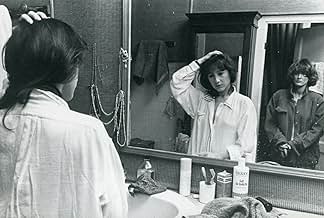Agrega una trama en tu idiomaLaurence, French teacher at a Lyon secondary school, simply can't take any more. Her doctor prescribes a week off. Whilst her partner Pierre has no idea how to help her, she decides to get a... Leer todoLaurence, French teacher at a Lyon secondary school, simply can't take any more. Her doctor prescribes a week off. Whilst her partner Pierre has no idea how to help her, she decides to get away and take stock of her life, both personal and professional.Laurence, French teacher at a Lyon secondary school, simply can't take any more. Her doctor prescribes a week off. Whilst her partner Pierre has no idea how to help her, she decides to get away and take stock of her life, both personal and professional.
- Dirección
- Guionistas
- Elenco
- Premios
- 3 nominaciones en total
Catherine Anne Duperray
- Josiane Lalande, le professeur chahuté
- (as Catherine-Anne Duperray)
Nicole Biondi
- La mère de Claudine
- (sin créditos)
Silvia Jouve
- La petite fille
- (sin créditos)
- Dirección
- Guionistas
- Todo el elenco y el equipo
- Producción, taquilla y más en IMDbPro
Opiniones destacadas
I have my own take on this masterpiece by the great Bertrand Tavernier and that is to listen; to listen to others and to oneself. Talk to others, but listen to others. Laurence played by Nathalie Baye ( who is one of France's finest actors ) is a schoolteacher and she is having a breakdown. She either has to stay in her profession, stay with her lover who adores her or move on. Is moving on the answer or staying still ? By talking to others she spends her time out from school and tries to make a decision. She listens to the problems of those around her and she is a child again in the classroom of life, and painfully and slowly she learns what a sublime horror it is to be human.
This film is a masterpiece because it explores both on a personal level and on a societal level. We all have problems of ageing, loving and eventually dying in a world that seems to make of us just a number. A song of the day, about being just a number plays more than once and Tavernier shows with intelligent persuasion that a pop song and a bad television programme can also help us understand life and to live. There is a wonderful kick at Opera in the film that had me cheering. Most need the smallest and most popular things to survive. That includes dialogue, which the film is full of and through dialogue with others we just may be strong enough to continue, to cohabit with an unjust world and to grow into just being ourselves. The scenario is full of working people, and not the luxury class of those who can afford not to care or who just feed off others without giving. A lot of cinema depicts these people but in this film they are not there. True life is richer than the laziness and opportunism of the rich.
I am astonished this film has only 4 reviews. People not wanting to listen perhaps ? Forty years on and in desperate times this film has perhaps greater relevance than in 1980 and a big thank you for Tavernier, Baye and all of the other actors for making this essential film what it is. It maybe ' old ' to some, but looks as fresh to me as its first outing in the cinema.
Although my memory is somewhat hazy (I saw this movie 17 years ago.), the concept of being stuck in a rut caught my attention. When the heroine takes her vacation, it is not just from work but from her personal life as well. I remember thinking about how her self-assessment would not have been as effective had she maintained her personal contacts during that time.
The French film Une semaine de vacances (1980) was shown in the U. S. with the title A Week's Vacation. It was co-written and directed by Bernard Tavernier.
The movie stars Nathalie Baye as Laurence, a high school teacher in Lyon. She's a good teacher, but she isn't happy at school. She's not happy about her boy friend. In fact, she's not happy about much in her life, although people think she should be happy.
My problem with the movie is that it's hard to like the protagonist. People ask her if she's going to keep teaching. People ask her what she would do if she stopped teaching. People ask her if she will marry her boy friend. People ask her if she wants to have children. Her answer to each of these questions is, "I don't know."
Bernard Tavernier was a great director. Nathalie Baye is a great actor. It's no surprise that the direction and acting were fine. However, I didn't appreciate the plot or identify with the protagonist.
Bernard Tavernier died on March 25th, 2021, just a few days before I wrote this review. He directed many great films, which I recommend. However, I consider this one of his lesser films.
I think that this movie is worth watching, but it's not a must-see. It has a weak IMDb rating of 6.7. I agreed, and rated it 7.
The movie stars Nathalie Baye as Laurence, a high school teacher in Lyon. She's a good teacher, but she isn't happy at school. She's not happy about her boy friend. In fact, she's not happy about much in her life, although people think she should be happy.
My problem with the movie is that it's hard to like the protagonist. People ask her if she's going to keep teaching. People ask her what she would do if she stopped teaching. People ask her if she will marry her boy friend. People ask her if she wants to have children. Her answer to each of these questions is, "I don't know."
Bernard Tavernier was a great director. Nathalie Baye is a great actor. It's no surprise that the direction and acting were fine. However, I didn't appreciate the plot or identify with the protagonist.
Bernard Tavernier died on March 25th, 2021, just a few days before I wrote this review. He directed many great films, which I recommend. However, I consider this one of his lesser films.
I think that this movie is worth watching, but it's not a must-see. It has a weak IMDb rating of 6.7. I agreed, and rated it 7.
Laurence (Nathalie Baye), thirty one years old, is a high school French teacher in Lyon. She has a good relation with her students, genuinely cares for them and they appreciate her efforts. She is reasonably attractive, charismatic and socially adept with neighbors and colleagues (one of them, a woman endowed with a oversized sense of humor is her best friend). She gets along well with her parents, which are aging in apparent harmony in a small village nearby and even with her ne'er-do-well brother Jacques. Her boyfriend Pierre is at times overbearing and unsubtle, but sincerely loves her and dreams of having a child with her. At times, he seems to know her better than she herself does. Her friend urges her to formalize her relationship with Pierre and start a family before her biological clock winds down.
All of this changes one morning, when Laurence has a near panic attack, is unable to face her class and misses school. She is given a week's vacation to sort out her (unexplained) problems. She reexamines her life in a new and rather negative light; in spite of her efforts her student's writing is full of cliches and platitudes, a neighbor responds improperly to her kindness and she tries clumsily to find a pretext to break up with Pierre. At this point, order and purpose disappear and we are faced with the chaos of real life; motivations are unclear or missing, actions have unexpected reactions and plans seem not to work any longer. Whether Laurence will strike a new path or go back to her previous life after the week's vacation is left open.
The movie rests squarely on Baye's shoulders; she is in almost every scene. She does an excellent job. The other actors are at the same level, among them Tavernier regular Philippe Noiret in a short role. The script is spare and (as the movie requires) does not attempt to weave a conventional plot. A successful movie.
All of this changes one morning, when Laurence has a near panic attack, is unable to face her class and misses school. She is given a week's vacation to sort out her (unexplained) problems. She reexamines her life in a new and rather negative light; in spite of her efforts her student's writing is full of cliches and platitudes, a neighbor responds improperly to her kindness and she tries clumsily to find a pretext to break up with Pierre. At this point, order and purpose disappear and we are faced with the chaos of real life; motivations are unclear or missing, actions have unexpected reactions and plans seem not to work any longer. Whether Laurence will strike a new path or go back to her previous life after the week's vacation is left open.
The movie rests squarely on Baye's shoulders; she is in almost every scene. She does an excellent job. The other actors are at the same level, among them Tavernier regular Philippe Noiret in a short role. The script is spare and (as the movie requires) does not attempt to weave a conventional plot. A successful movie.
"Une Semaine De Vacances" (1980) is not a film for every taste or mood. Do not expect a strong narrative - in fact, there is not the tiniest shred of plot during its 100 minutes. The celebrated writer-director Bertrand Tavernier is not a notable visual stylist, either. What he is, though, is a poet of the everyday, the banal. It's a small, quiet, subtly melancholic film about depression. Not an official follow-up to Tavernier's own "L'Horloger de Saint-Paul" (1974), though it does briefly catch-up with Philippe Noiret as the same character from that film, and it is also - refreshingly - set in Lyon. Nathalie Baye is one of the most talented French actresses of her generation and, despite what her character says at one point, very pretty, too: her smile lights up the whole screen. There are a couple of terrific songs, too. **1/2 out of 4.
¿Sabías que…?
- TriviaPhilippe Noiret makes an appearance, reprising his same role of Michel Descombes from "L'Horloger de Saint-Paul"(1974). Both films take place in Lyon.
- Créditos curiososto Jean Aurenche
Selecciones populares
Inicia sesión para calificar y agrega a la lista de videos para obtener recomendaciones personalizadas
- How long is A Week's Vacation?Con tecnología de Alexa
Detalles
- Fecha de lanzamiento
- País de origen
- Idioma
- También se conoce como
- A Week's Vacation
- Locaciones de filmación
- Lycée Edouard-Herriot, Place Edgar Quinet, Lyon, Rhône, Rhône-Alpes, Francia(exteriors: school)
- Productoras
- Ver más créditos de la compañía en IMDbPro
- Tiempo de ejecución
- 1h 42min(102 min)
- Mezcla de sonido
- Relación de aspecto
- 2.35 : 1
Contribuir a esta página
Sugiere una edición o agrega el contenido que falta


























